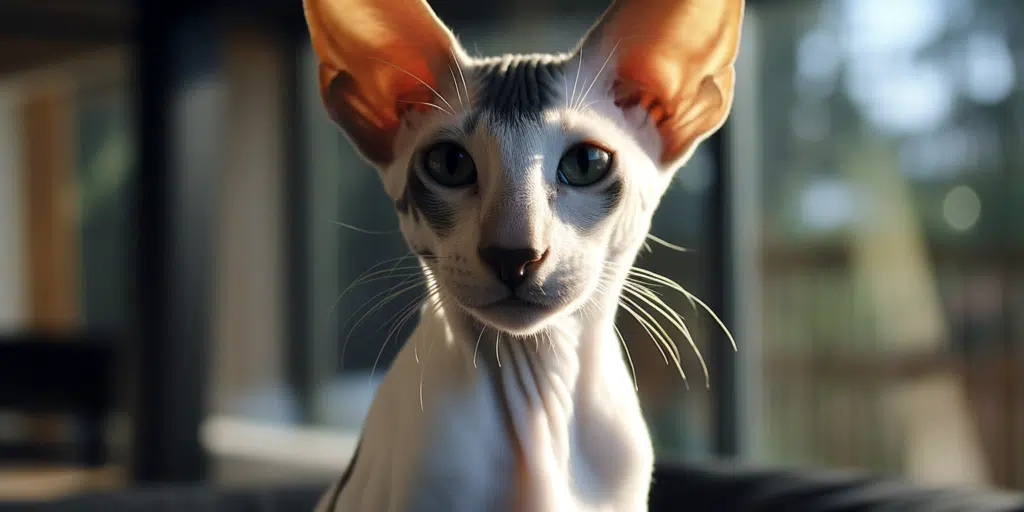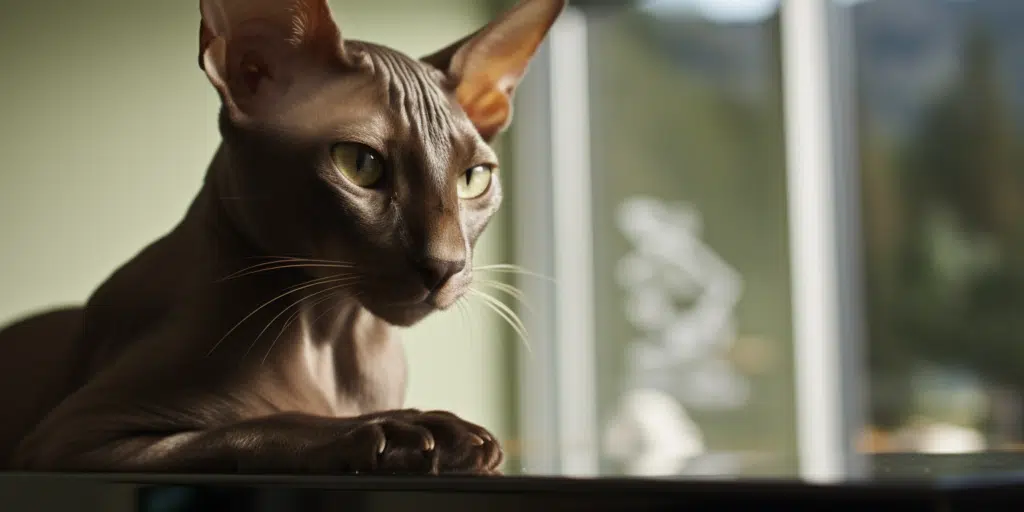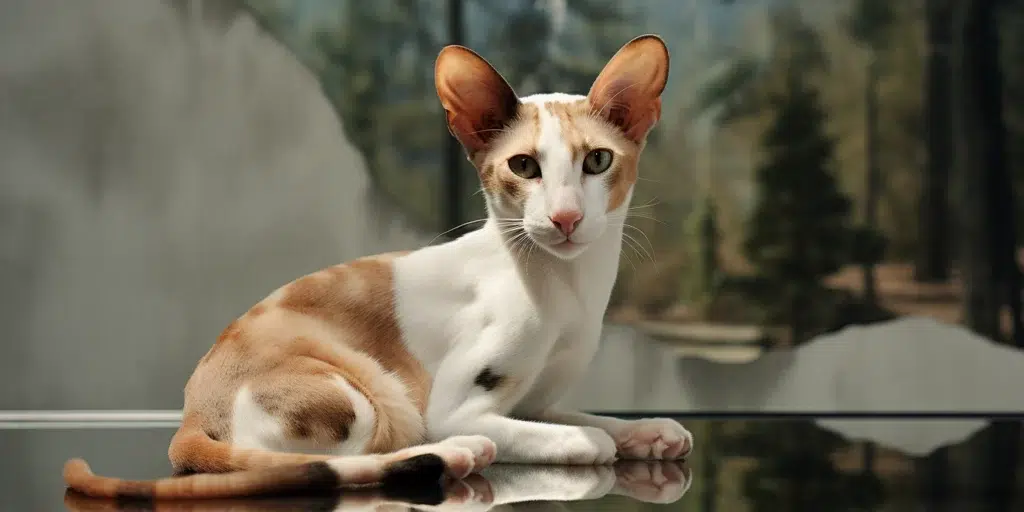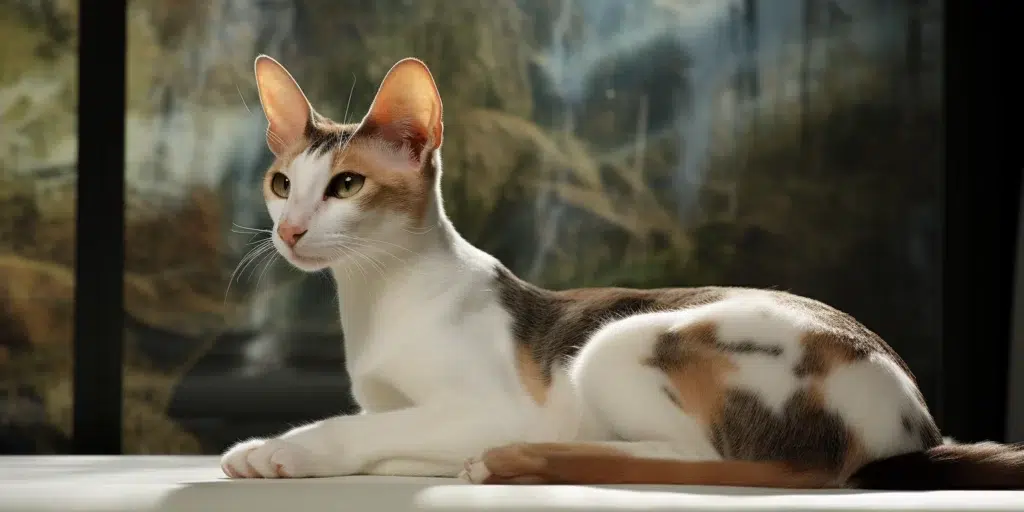When it comes to cats, every breed has its own set of fascinating traits and characteristics. One aspect that cat lovers are particularly curious about is their feline friends’ vocal abilities. Today, let’s dive into the enchanting world of the Oriental Shorthair vocal prowess. This breed, known for its sleek body and striking eyes, also has a unique voice that captivates many cat enthusiasts.
In the universe of cats, the Oriental Shorthair stands out not just for its elegant appearance but also for its vocal cords. But what exactly makes the Oriental Shorthair vocal expressions so intriguing? Is it the frequency of their meows, or is there a hidden language they’re trying to convey? Let’s embark on a melodious journey to uncover the mysteries behind the Oriental Shorthair’s vocalizations.
Oriental Shorthairs are indeed a melody in the feline world. Their voices are a blend of purrs, meows, and sometimes even musical trills that can fill a room with their presence. But what fuels their desire to communicate so fervently? Is there more to their vocal endeavors than meets the ear? Stay tuned as we decode the symphony of sounds produced by the Oriental Shorthair vocal cords.

Are Oriental Shorthair Vocal Cats?
Yes, Oriental Shorthair cats are indeed vocal. This breed is known for its willingness to engage in vocal exchanges, often expressing their needs, desires, and opinions loudly. The uniqueness of their voice, combined with their sociable nature, makes them one of the most vocal breeds out there.
The gender of the Oriental Shorthair can sometimes influence its noise levels, with males generally being more talkative, especially when they’re looking for a mate. However, this isn’t a hard and fast rule, as there are plenty of chatty females as well.
What’s fascinating is that, just like humans, individual cats within this breed have unique personalities – some might be the life of the party, always in for a chat, while others prefer to speak only when they really have something to say.
Moreover, the activity and exercise levels of these cats can impact their vocalization. Generally, a more active Oriental Shorthair might not be as vocal, given they’re busy exploring and playing. However, once they’ve settled down or if they’re seeking your attention to start their next adventure, their vocal cords spring into action, making sure their presence is known.
Factors That Influence Oriental Shorthair Noise Levels

Their Age
Age plays a significant role in the vocal patterns of Oriental Shorthairs. Kittens are known to be more vocal as they navigate through their new world, using their voices to seek attention and communicate their needs. As they grow into adolescence, their meowing might decrease slightly as they become more independent and exploratory.
However, it’s during their prime years that their vocal abilities truly shine. They’ve mastered the art of communication and aren’t afraid to use it. Whether it’s a demand for food, a desire for your undivided attention, or simply a greeting when you walk through the door, their confidence in their voice is unwavering.
When they advance in age, Oriental Shorthairs might become more vocal again, albeit for different reasons. As their senses and cognitive functions change, they might meow more out of confusion or a need for reassurance. It’s a tender phase where understanding and patience with their vocalizations become crucial.
Feeding Oriental Shorthair and Its Relation to Noise Levels
Meal times are like a concert for the Oriental Shorthair, with vocals peaking in anticipation. The connection between their feeding schedule and their vocal expressions is undeniable. An Oriental Shorthair that knows its mealtime is approaching may start a vocal countdown, reminding everyone of the impending feast.
Conversely, if their meals are delayed or if they’re seeking treats, their vocalizations can become more urgent or persistent. It’s their way of ensuring their dietary needs aren’t overlooked. Establishing a consistent feeding schedule can help regulate their mealtime serenades, turning them into predictable yet enjoyable intermissions.
Interestingly, the type of food might also influence their vocal appreciation. Finding the right diet that satisfies their taste and health requirements might just earn you some melodic purrs of approval, showcasing a content and well-fed Oriental Shorthair.

Oriental Shorthair Exercise Level Affects Their Noise Levels
Exercise and play are not just physical outlets for Oriental Shorthairs; they’re also vocal exercises. A cat kept busy with toys and activities is less likely to vocalize out of boredom or frustration. Engaging their minds and bodies can lead to quieter periods, as they expend energy through chasing and exploring rather than talking.
However, post-exercise might bring about a different kind of vocalization – the satisfied purrs and soft meows indicative of a well-spent day. It’s a balance; enough activity keeps them quieter, but the contentment of a good play session brings out gentle, happy sounds.
The interaction during playtime also strengthens your bond, creating more opportunities for quiet, affectionate vocal exchanges. It showcases the versatility of their vocal expressions, from the loud demands for attention to the soft whispers of contentment.
Medical Conditions
Sometimes, an increase in vocalization can signal underlying health issues. Oriental Shorthairs, vocal by nature, might start to use their voice more if they’re in discomfort or pain. It’s their way of telling you that something isn’t right.
Changes in vocal patterns, such as an unusual pitch or a sudden increase in volume, warrant attention. It could be as simple as a temporary discomfort or as complex as the early stages of a medical condition. Keeping an ear out for these changes is important.
Regular check-ups with a veterinarian can help catch any issues early, ensuring that your Oriental Shorthair stays healthy and their vocalizations return to their normal symphony of sounds.
Oriental Shorthair Noises and Their Meaning
Understanding the myriad of sounds your Oriental Shorthair makes is like learning a new language. Each meow, purr, or hiss is a window into their emotions, desires, and well-being. Recognizing what different sounds mean can enhance your bond and enable you to cater to their needs more effectively.

Meow (The Most Common Noise)
The “meow” is the Oriental Shorthair’s staple. It can mean anything from “hello” to “feed me, now!” The key to understanding their meow lies in observation. Over time, you’ll start to notice subtle differences in tone, length, and pitch, helping you decipher their meow-code.
Purring (The Most Enjoyable Cat Noise)
Purring is often associated with contentment and happiness. When your Oriental Shorthair purrs as you pet them, it’s a sign of their trust and satisfaction. However, purring can sometimes also indicate pain or distress, making it a complex vocal expression to interpret.
Hissing (Your Cat Feels In Danger)
Hissing is a clear sign of discomfort or fear. If your Oriental Shorthair is hissing, it’s crucial to evaluate the situation and remove any immediate threats. Understanding this reaction can prevent stressful scenarios for both you and your cat.
Yowl (Not a Happy Meow)
A yowl is a longer, more drawn-out meow, often expressing unease or distress. It could indicate frustration, loneliness, or even health issues. Paying attention to yowls can help you address the root cause of their discomfort.
Growls (Not as Scary as a Tiger)
Growling might seem intimidating, but it’s another form of communication. It can signal annoyance or a warning to back off. Respecting their space when they growl can prevent misunderstanding and strengthen mutual respect.
Some Cats are More Talkative Than Others
Indeed, some Oriental Shorthairs are more vocal than others. Personality plays a significant role in determining how much they choose to “talk.” While some enjoy a daily chat, others might only vocalize when necessary. Embracing their unique personalities is part of the joy of living with these captivating creatures.
How to Make Oriental Shorthair Less Vocal?
If you’re looking to reduce the vocalizations, consider adjusting their environment to meet their needs better. Providing regular playtime, consistent feeding schedules, and plenty of affection can help address the reasons behind their vocal demands. Also, pay attention to any changes that may indicate health issues or distress.

Conclusion
The Oriental Shorthair’s vocal abilities are a unique and endearing part of their charm. By understanding and responding to their vocal cues, you can build a deeper connection with your feline friend, ensuring a harmonious and happy life together. Embrace their songs, for in each meow, purr, and hiss, lies a note of their affection for you.